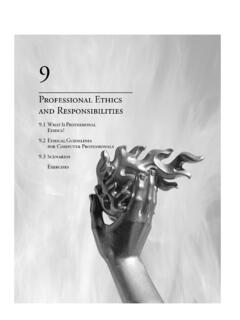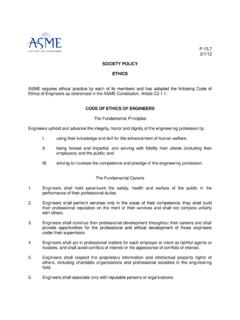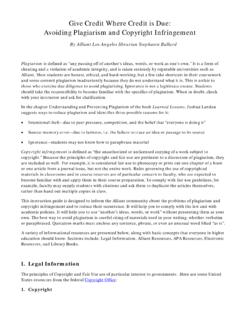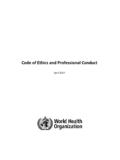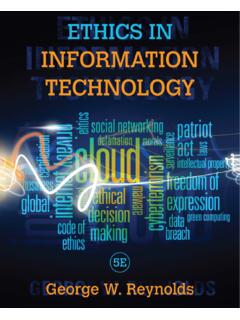Transcription of COMPUTER ETHICS, PRIVACY AND SECURITY
1 COMPUTER ethics , PRIVACY AND SECURITYC omputer ethics Computers are involved to some extent in almost every aspect of our lives They often perform life-critical tasks COMPUTER science is not regulated to the extent of medicine, air travel, or construction zoning Therefore, we need to carefully consider the issues of ethicsEthics ethics are standards of moral conduct Standards of right and wrong behavior A gauge of personal integrity The basis of trust and cooperation in relationships with othersEthical Principals Ethical principals are tools which are used to think through difficult situations.
2 Three useful ethical principals: An act is ethical if all of society benefits from the act. An act is ethical if people are treated as an end and not as a means to an end. An act is ethical if it is fair to all parties ethics COMPUTER ethics are morally acceptable use of computers using computers appropriately Standards or guidelines are important in this industry, because technology changes are outstripping the legal system s ability to keep upComputer ethics Four primary issues PRIVACY responsibility to protect data about individuals Accuracy- responsibility of data collectors to authenticate information and ensure its accuracy Property- who owns information and software and how can they be sold and exchanged Access- responsibility of data collectors to control access and determine what information a person has the right to obtain about others and how
3 The information can be usedProblems with Large Databases Spreading information without consent Some large companies use medical records and credit records as a factor in important personnel decisions Spreading inaccurateinformation Mistakes in one COMPUTER file can easily migrate to others Inaccurate data may linger for yearsPrivate Networks Employers may legally monitor electronic mail In 2001, 63% of US companies monitored employee Internet connections including about two-thirds of the 60 billion electronic messages sent by 40 million e-mail users.
4 Most online services reserve the right to censor content These rights lead to contentious issues over property rights versus free speech and privacyThe Internet and the Web Most people don t worry about email PRIVACY on the Web due to illusion of anonymity Each e-mail you send results in at least 3 or 4 copies being stored on different computers. Web sites often load files on your COMPUTER called cookies to record times and pages visited and other personal information Spyware -software that tracks your online movements, mines the information stored on your COMPUTER , or uses your COMPUTER for some task you know nothing about.
5 E-Mail Netiquette Promptly respond to messages. Delete messages after you read them if you don t need to save the information. Don t send messages you wouldn t want others to read. Keep the message short and to the point. Don t type in all capital letters. Be careful with sarcasm and humor in your Content & Free Speech Issues Information on internet includes hate, violence, and information that is harmful for children How much of this should be regulated? Do filters solve problems or create more? Is web site information used for course work and research reliable?
6 Information Ownership Issues Illegal software copying (pirating) Infringement of copyrights by copying of pictures or text from web pages Plagiarism by copying text from other sources when original work is expectedTe r m s INTELLECTUAL PROPERTY: Creations protected by law TRADE SECRET: Work or products belonging to a business, not in public domain COPYRIGHT: Protecting intellectual property from copying by others for 28 years PATENT: Legal document granting owner exclusive monopoly on an invention for 17 yearsCopyright Laws Software developers(or the companies they work for) own their programs.
7 Software buyersonly own the right to use the software according to the license agreement. No copying, reselling, lending, renting, leasing, or distributing is legal without the software owner s Licenses There are four types of software licenses: Public Domain Freeware Shareware All Rights ReservedPublic Domain License Public domain software has no owner and is not protected by copyright law. It was either created with public funds, or the ownership was forfeited by the creator. Can be copied, sold, and/or modified Often is of poor quality/unreliableFreeware License Freeware is copyrighted software that is licensed to be copied and distributed without charge.
8 Freeware is free, but it s still under the owner s License A shareware software license allows you to use the software for a trial period, but you must pay a registration fee to the owner for permanent use. Some shareware trials expire on a certain date Payment depends on the honor system Purchasing (the right to use) the software may also get you a version with more powerful features and published Rights Reserved License May be used by the purchaser according the exact details spelled out in the license agreement.
9 You can t legally use it--or even possess it-- without the owner s Source What is Open Source? Source code is free to look at. Compiled application is (typically) free to use. Licensed under one of many OSS licenses. Licenses are typically GPL compatible. GPL GNU General Public License v3 Created by Richard Stallman Fundamental example of an open-source license. Highly ( use_gpl_code ) {distribute_changes_as_gpl();distribute_ linked_apps_as_gpl_compatible();}Open Source LGPL GNU Lesser General Public License Can be linked to by non-GPL compatible software.
10 Can be distributed with your ( modify_lgpl_program ) {distribute_changes_as_lgpl();} else {distribute_however_you_like();}Open Source MIT License Only 20 lines! Liberal terms. Use this code however you ( modify_mit_program ) {sublicense_however();give_attribution() ;} else {distribute_with_mit_license();} COMPUTER Crime COMPUTER criminals -using a COMPUTER to commit an illegal act Who are COMPUTER criminals? Employees disgruntled or dishonest --the largest category Outside users - customers or suppliers Hackers and crackers - hackers do it for fun but crackers have malicious intent Organized crime - tracking illegal enterprises, forgery, counterfeitingTypes of COMPUTER Crime Damage to computers, programs or files Viruses - migrate through systems attached to files and programs Worms - continuously self-replicate Theft Of hardware, software, data.
